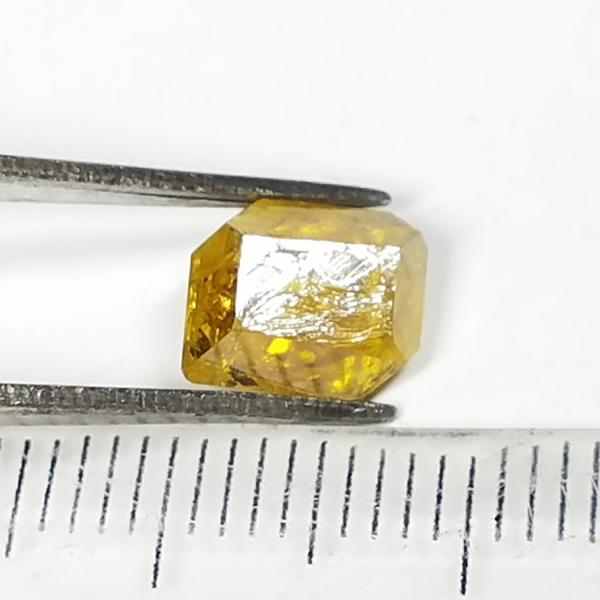Lab-Grown Diamonds
Lab-grown diamonds, also known as synthetic diamonds or cultured diamonds, are a revolutionary and sustainable alternative to natural diamonds. As consumer awareness about ethical sourcing and environmental sustainability continues to grow, lab-grown diamonds have emerged as a popular choice for people seeking diamonds with a smaller ecological footprint.
As a company, we feel it is necessary to properly inform and educate our customers about both, lab and natural diamonds so the final purchase decision can be made with an informed mindset.

What Are Lab-Grown Diamonds?
Lab-grown diamonds are diamonds that are produced in highly controlled laboratory environments using advanced technological processes that mimic the natural conditions under which diamonds form in the Earth's mantle. These diamonds have the same physical, chemical, and optical properties as natural diamonds, making them indistinguishable to the naked eye. Lab Diamonds can be detected through various testing tools.
How Are Lab-Grown Diamonds Created?
Lab diamonds are created through 2 key methods: High Pressure High Temperature (HPHT) and Chemical Vapor Deposition (CVD). Both methods result in the same outcome; a creation of high-quality diamonds that are chemically and structurally identical to natural diamonds.
High Pressure High Temperature (HPHT): A small diamond seed is placed in carbon under high pressure and high temperature, replicating the conditions found in the Earth's mantle where natural diamonds are formed. The carbon atoms then stick to the diamond seed, resulting in the growth of a larger diamond crystal.
Chemical Vapor Deposition (CVD): A diamond seed is placed in a chamber filled with a carbon-rich gas. Energy is then applied to the chamber, causing the carbon atoms to bond and form layers on the diamond seed, gradually growing into a larger diamond crystal.
Benefits of Lab-Grown Diamonds
Ethical Sourcing, Conflict-Free and Traceable
One of the most significant advantages of lab-grown diamonds is their ethical provenance. Unlike natural diamonds, lab-grown diamonds are produced without the environmental and humanitarian concerns often associated with traditional diamond mining. Lab-grown diamonds are also largely traceable since they are grown in factories in India and China. This means that lab-grown diamonds are inherently conflict-free, offering peace of mind to consumers who prioritize ethical sourcing and responsible consumption.
Environmental Sustainability
Traditional diamond mining can have a significant environmental impact, including habitat destruction, water and soil contamination, and carbon emissions. In contrast, lab-grown diamonds have a considerably smaller ecological footprint, as they do not require large-scale mining operations. By choosing lab-grown diamonds, consumers can reduce their environmental impact and contribute to the conservation of natural resources.
Exceptional Value and Quality
Lab-grown diamonds offer exceptional value and quality, often at a more accessible price point compared to natural diamonds of similar size and quality. The cost-effective nature of lab-grown diamonds allows consumers to purchase stunning, high-quality diamonds without compromising on beauty or durability.
Diversity of Choice
Lab-grown diamonds can be produced in a wide range of carat weights, colors, clarities, and cuts, providing consumers with a diverse selection to suit their individual preferences. endless possibilities for creating unique and personalized jewelry pieces.
Downsides of Lab-Grown Diamonds
Energy-Intensive Production
The process of growing diamonds in a lab requires a significant amount of energy. This energy consumption contributes to the carbon footprint of lab-grown diamonds especially since lab diamonds are largely grown inn China and India where the energy largely comes from fossil fuels. However, it's important to consider that lab-grown diamonds still have a smaller overall environmental impact compared to traditional diamond mining.
Perceived Value:
Some consumers and industry professionals may still perceive lab-grown diamonds as having lower value compared to natural diamonds. This perception may impact the resale value of lab-grown diamonds.
Lab-grown diamonds are made with technology and will inherently follow the pricing structure of technology too. This essentially means that the prices of lab-grown diamonds are likely to reduce with time as technology advances, processes become more efficient and supply increases.
Impact on Traditional Diamond Mining Communities:
The rise in popularity of lab-grown diamonds has raised concerns about the
potential impact on traditional diamond mining communities who rely on natural
diamond extraction for their livelihoods. The diamond industry is the largest
contributor to the GDP of many African nations. It is important to consider the
potential socioeconomic implications of shifting demand away from natural
diamonds since the majority of lab-grown diamonds are produced in India and
China.
OTHER FAQ
Does Milano Sell Lab-Grown Diamonds
Yes, at Milano we sell high-quality lab grown diamonds loose or studded in Gold or Silver Jewelry.
Are Lab-Grown Diamonds Cheaper?
Yes, Lab-Grown Diamonds are much cheaper than Natural Diamonds and will continue to become cheaper with time.
How do I evaluate the quality of Lab-Grown Diamonds?
Lab-Grown Diamonds are evaluated in the same manner as Natural Diamonds by many of the most recognizable Gem Laboratories across the world. We primarily work with GIA, IGI and EGL. These Labs evaluate Lab-Diamonds based on the 4C's: Cut, Clarity, Color and Carat.
Are Lab-Grown Diamonds a good investment?
Like any stone, the resale value of Lab-Grown Diamonds can change over time. Unlike Natural Diamonds which are limited in supply. Lab-Grown Diamonds can be grown at a limitless capacity and are therefore less valuable.
Can I tell the difference between Natural & Lab-Grown Diamonds?
Only a trained gemologist may be able to tell the difference between a natural or lab grown diamond through the use of technology. The best way to know the difference is to buy a diamond that is certified by an accredited lab like GIA, EGL or IGI.
Are Lab-Grown Diamonds ethical?
Lab-grown diamonds are often considered an ethical choice in Diamonds due to its provenance. However, since they are not mined, they do not adhere to the Kimberly Process.





